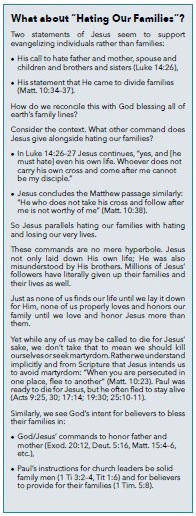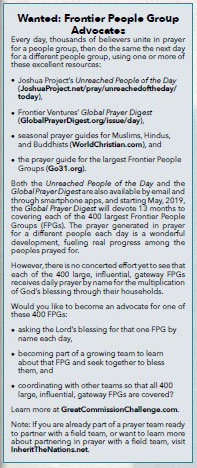The Family—God’s Blessing to All Peoples

We thought it would be safer1 and faster to win individuals. We found it to be safer and faster to win households and other groups.
— Trevor Larsen,* coach for rapidly multiplying movements
However, when movement coaches urge winning house-holds rather than individuals, some react:
What about Jesus identifying those who do God’s will as his mother and brothers? What about Jesus saying he came to divide families? And what about Jesus telling us to hate our families?
Do these rare “hard sayings” overrule the Bible’s emphasis on honoring our parents and providing for our families?
Individualism vs. Family
In recent centuries, Western society has embraced individualism—valuing the independence of individuals above family and societal expectations. Individualism says, “Save your own life and pursue your own dreams, regardless of how that affects others.” This contributes to the breakdown of families.![]()
Throughout most of history, however, societies have held the opposite value system. In the Bible, and much of the world still (especially Frontier People Groups, or FPGs), is valued service to family and community above personal dreams and independence. independence: “Don’t seek to save your own life. Pursue the benefit of your family and your people in the generations to come.”
At a Pakistan university a Western guest speaker said:
“I am not here to tell you how to succeed by yourself, because that is not important. What is important is for your families and communities, back in your homelands, to become healthy and strong and have all their needs met. What I am telling you today is not just for you, but for your family and people for generations to come.”
The students began clapping—slowly at first, then rising to a standing ovation.
“I have never seen our students clap before!” the department head later told the speaker. “What you said has touched our hearts.”
Does Jesus’ sacrifice for the rest of humanity represent a family centered or individualistic value system?
Does our gospel urge individuals to break with their family and people in order to follow Jesus, or to become God’s blessing to their household and the generations to come?
Family (Mishpachah) in the Bible
Mishpachah appears more than 300 times in the Old Testament. There is no direct parallel in English, as mishpachah includes “generations yet to come.” Mishpachah is just one in a set of Hebrew and Greek words with a generational perspective, variously translated clan, family, tribe, people, or nation. In English we could think of all of these as “family lines” of varying sizes.
In God’s foundational promise to Abram (Abraham) in Gen. 12:3, the final recipient of God’s blessing will not be every individual, but ALL mishpachah. Paul labels this promise “the gospel preached in advance to Abraham” (Gal. 3:8). Blessing and salvation aren’t just for individuals, but also for households and whole family lines.
From this biblical perspective, we can understand the biblical terms translated people/nation as:
Households bonded together in preserving a shared generational identity—through intermarriage, the continuation of traditions, and rejection of outside influences.
Many FPGs are isolated from the gospel in part by their perception and fear of Christianity as a threat to their households and to the historic identity they are seeking to preserve. One study of Christianity in India observed this in action:
The adoption of Christianity by one group within a generic community would lead to a strengthening of non-Christian identity among other groups within the same community.2
When our evangelism methods win individuals away from their families among FPGs, we reinforce these fears within the FPG.
The Father loving ALL mishpachah back to himself
Woven throughout Scripture, we see God’s intertwined commitment to bless individuals, households and family lines (nations/peoples):
- Individuals blessed by God receive redemption, adoption into God’s family, a commission to be fruitful (reproduce) and a physical or spiritual family line (generational blessing and destiny).
- Households blessed by God experience healing, strengthening and unity to become His stable, reproducing vehicle of blessing to other households and future generations.3
- Nations/peoples blessed by God temper their fierce independence to embrace a new and better identity and destiny—in Him. They too become “His mishpachah.” 4
Even before the Fall, God blessed mankind (the first household) with a commission they were to fulfill as households (to reproduce, Gen 1:28). God later blessed Abram with a commission for his family line to become God’s blessing to all mishpachah. Israel was thus chosen as the first family line to bless the rest, for other family lines to follow suit. As each of our family lines is adopted into God’s family, we too share in this commission/blessing.
HisStory (and the gospel) can be summarized this way:
God (Father, Son and Holy Spirit) is patiently loving estranged individuals, households and family lines back into His family line, then calling our family lines to join Him in loving the rest of the estranged human family—in every family line—back to Himself.
The commission is for our children and disciples
In the verses above, we also see that the commission is not for Abraham to fulfill alone, but for the generations to come. We (Abraham’s spiritual children) carry this commission as well, along with the responsibility for teaching it to the next generation. Our main responsibility (next to intimate friendship with God) lies in what we model and teach our children and disciples, not just in what we ourselves accomplish for God’s kingdom.
The blessing/commission throughout Scripture
This blessing/commission, through Abraham’s seed for all peoples (family lines), is repeated directly to Abraham two more times (Gen. 18:18, 22:18), then to Isaac (26:4), then to Jacob (28:14). The Old Testament, especially the Psalms, carries many more explicit and implicit references to this blessing/commission. In the New Testament, more explicit references include:
- Acts 3:25 (Peter references Gen. 22:18 and 26:4): “You are heirs of … the covenant God made with your fathers. He said to Abraham, ‘Through your offspring all peoples on earth will be blessed.’”
- Galatians 3:8 (Paul references Gen. 12:3, 18:18 and 22:18): “Scripture … announced the gospel in advance to Abraham: ‘All nations will be blessed through you.’”
- Hebrews 6:17 (the author references Gen. 22:16–18): “Because God wanted to make the unchanging nature of his purpose very clear to the heirs of what was promised, he confirmed it with an oath.”
The “Great Commission” of Matt. 28:18–20, along with the parallel commissions in the other gospels and Acts, are all in direct fulfillment of God’s commission to Abraham.
The commission starts with intercession
Then the LORD said, “Shall I hide from Abraham what I am about to do? Abraham will surely become a great and powerful nation, and all nations on earth will be blessed through him. For I have chosen him, so that he will direct his children and his household after him to keep the way of the LORD by doing what is right and just, so that the LORD will bring about for Abraham what he has promised him” (Gen.18:17–19, emphasis added).
In the larger story where these verses appear, God sets up Abraham to bless others through intercession. Abraham responds by pleading for God’s mercy on Sodom and Gomorrah, where Abraham’s nephew Lot lives.
Practical implications
Movements happen only when the gospel blesses and multiplies through households and other natural groupings. In 1982 Donald McGavran observed that 90% of missionaries among the unreached were attempting to draw individuals away from their families rather than bless these families with a view to starting movements.5
Might FPGs more readily embrace Jesus if we present the gospel in Paul’s terms, as:
- God’s desire to redeem and bless their households and their full family line through following Jesus together,
- rather than urging individuals to break with their family and community to follow Jesus?
Breaking with family should not be the common practice our evangelism sometimes makes it into. Let us learn to invite families to pursue God together, just as we see throughout the Bible.
Jesus came to give life, and to bless all the families of the earth (John 1:10 and Gal. 3:8). This was His practice, and it should be ours also.
Thus we must ask, individually and collectively, do our ministry approaches aim to:
- produce a visible bouquet of flowers cut off from their roots (winning individuals away from their families to produce a church of gathered strangers such as we are familiar with back home), or
- plant gospel seeds that can spread to produce a forest in the years to come (blessing households with God’s word in a way that multiplies throughout a people)?










comments